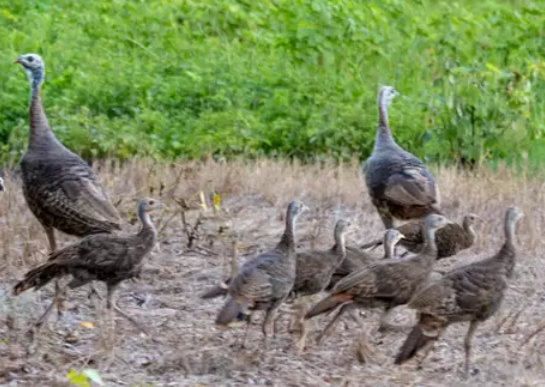Source: Florida Fish & Wildlife Conservation Commission (FWC)
Report all wild turkey sightings this summer
If you see a wild turkey – a hen with or without poults, a jake or a gobbler – anywhere in Florida between now and Aug. 31, 2022, please report the sighting online or download and report via the Survey123ArcGIS app on your mobile device.
By reporting wild turkey sightings, you can help FWC biologists learn more about annual nesting success, brood survival, and the distribution and abundance of wild turkeys. The FWC conducts the summer wild turkey survey every year. See below for summaries of previous year’s results.
–
Why the Survey is Important
Wild turkeys are abundant in Florida and are found throughout the state.
Nesting success can vary each year based on several factors including weather conditions, predation, and habitat characteristics/quality. Fluctuations in nesting success and brood survival strongly influence wild turkey populations. When reproduction in a given year is good, populations tend to increase in subsequent years. By reporting wild turkey sightings, you’re helping provide a way to gauge wild turkey nesting success, brood survival, and population dynamics at statewide and regional levels.
Florida’s annual summer wild turkey survey is part of a larger regional study designed to provide more insight into the distribution and abundance of wild turkeys. The information, combined with harvest data, lets FWC biologists scientifically manage the wild turkey population—ensuring we have a thriving population now and in the future.
–
About Nesting and Brood Rearing
- In Florida, wild turkeys begin breeding in late February and early March.
- Egg laying usually begins in mid-to late March, though nesting dates can range from early March to June.
- Hens create a nest by scratching a shallow depression in the soil where she lays an average of 9 to 11 eggs.
- It takes approximately 12-13 days to lay the full clutch of eggs and another 25-26 days of continuous incubation for them to hatch. Hens do all the incubating and brood rearing.
- Newly hatched wild turkeys, called poults, are highly mobile and can feed themselves soon after hatching.
- Poults are flightless until they are about 2 weeks old and roost on the ground under the hen’s wings and tail during that time. Between 2 to 4 weeks of age, they begin to fly into low branches or small trees to roost.
- Poults eat primarily insects during the summer. They need higher levels of protein for rapid growth and flight feather development.
- Learn more about wild turkeys and wild turkey management.
–

